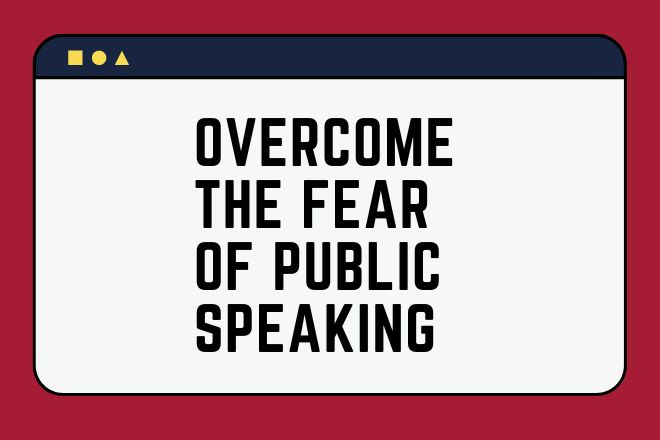Best Noise-Canceling Headphones for Writers: Enhance Focus and Creativity
Overcome The Fear of Public Speaking

Many individuals are affected by the fear of public speaking or glossophobia, which hinders their ability to express themselves confidently. This article will explore strategies to overcome speech anxiety and develop the necessary presentation skills to speak in public and give an impactful speech.
Public speaking is an essential skill that can significantly impact personal and professional success. It allows you to convey ideas effectively, influence others, and create meaningful connections. However, speaking in front of an audience is a common fear and can be terrifying. We'll explore ways to manage this anxiety disorder and ace your speech or presentation.
Understanding the Fear of Public Speaking
Before exploring strategies for overcoming public speaking fear, it is crucial to understand its underlying causes. Fear of being judged, failure, or lack of self-confidence can be among the causes.
It can manifest through psychological and physiological symptoms, including increased heart rate, sweating, trembling, and mental blocks. Acknowledging and recognizing this common form of anxiety is the first step towards conquering the fear.
Identifying and Addressing the Root Causes of Speech Anxiety
Addressing the root causes of one's fear of speaking in front of others is essential to overcome this fear. Self-awareness and introspection play a significant role in this process.
By understanding your public speaking fears and examining the negative beliefs associated with them, you can challenge and replace them with positive affirmations. Identifying specific triggers that intensify your fear will enable you to develop targeted strategies to address them. You can become more relaxed in delivering your speech. We recommend some outstanding books on public speaking!
Preparing for Successful Public Speaking
Adequate preparation is critical to building confidence and reducing anxiety when facing a public speaking event. If you are a learner who does better with courses, look at our list of Best Online Courses on public speaking.
Start by developing a clear and concise message that aligns with your objective. Structure your presentation logically, with a compelling introduction, informative body, and memorable conclusion.
Rehearsing your presentation multiple times will enhance your familiarity with the content and boost your confidence. Practice alone at first. Ensure you are comfortable with visual aids, such as using a projector with a presentation clicker, PowerPoint slides, or props.
Building Confidence to Overcome Your Fear and Ways to Manage Public Speaking Anxiety
Building confidence and practicing your communication skills is crucial for overcoming your fear of public speaking.
Tips to overcome your fear
- Visualization techniques, such as picturing yourself delivering a successful presentation at a podium or in front of a group, can help reduce anxiety and fear while increasing self-assurance.
- Positive affirmations and self-talk can also boost confidence levels.
- Take a breath. Deep breathing exercises and relaxation techniques, such as progressive muscle relaxation, can help manage public speaking anxiety before and during a speech.
- Find ways to gradually expose yourself to speaking opportunities. Practice in front of small groups and gradually move up to larger audiences. Seeing friendly faces can desensitize you to fear and build confidence over time. Try practicing Table Topics in a Toastmasters group setting.
Effective Communication Techniques
- Establish rapport with your audience by maintaining eye contact, using open body language, and employing appropriate facial expressions.
- Vocal modulation, including tone, pitch, and pace, can enhance the impact of your message.
- Visual aids, such as slides or props, should be used sparingly to support your presentation without overpowering it. If you are giving a slide presentation, get comfortable using a presentation clicker. Here is our list of the best presentation clickers for your next speech so you're not fumbling dealing with your laptop.
Overcoming Challenges During Public Speaking
Challenges may arise during public speaking engagements, and being prepared to tackle them can help alleviate anxiety. Stage fright is a common challenge, but you can channel that energy positively by embracing nervous energy and reframing it as excitement.

Handling unexpected situations or questions can be managed through active listening, pausing to gather your thoughts, and providing concise responses. It is important to remember that mistakes are a part of the learning process, and embracing them allows personal growth and improvement.
Seeking Support and Continuous Improvement
Seeking support and continuous improvement are vital to overcoming speech anxiety. Joining public speaking clubs or organizations, such as Toastmasters, can provide a supportive and nurturing environment for practicing and receiving constructive feedback.
Actively seeking feedback from trusted individuals or mentors allows you to identify areas for improvement and refine your skills. Regular practice and self-reflection enable continuous growth and help maintain confidence in public speaking.
Conclusion
Overcoming the fear of public speaking is a journey that requires self-reflection, preparation, and continuous practice.
By understanding the root causes of anxiety, developing effective communication techniques, building confidence, and seeking support, individuals can transform their public speaking skills and conquer fear. Embracing the opportunities to speak publicly enhances personal growth and opens doors to new possibilities and success.
FAQs
How long does it take to overcome the fear of public speaking?
The duration of overcoming the fear of public speaking varies from person to person. It depends on factors such as the individual's dedication, the intensity of the fear, and the techniques utilized. However, with consistent effort and practice, significant progress can be made within a few months.
Is it normal to feel nervous before public speaking? Is this a common fear?
Yes, it is entirely normal to feel nervous before public speaking. Nervousness is a natural response to a challenging situation. The key is positively managing and channeling that nervous energy through preparation and relaxation techniques. Take deep breaths, have positive thoughts, and feel confident you know your topic. You don't have to know your speech word for word, but be familiar with the information you want to present.
Can anyone become a confident public speaker?
Anyone can become a confident public speaker and give a speech or presentation with the right mindset, practice, and guidance. Public speaking is a skill developed over time with dedication and effort.
What if I make a mistake during a presentation?
Making mistakes during a presentation is common, even for experienced speakers. It is important to remember that mistakes do not define your abilities. Acknowledge the error, take a moment to regain composure, and continue with your presentation.
How can I deal with a hostile audience?
Dealing with a hostile audience can be challenging. The key is to remain calm and composed. Listen actively to the audience's concerns, address them respectfully, and maintain a positive and professional demeanor. If necessary, seek support from event organizers or moderators to manage the situation effectively.
Yes! I want Bad Grammarian updates and promotions!
No Spam Zone. We will never spam or sell your email address!
Yes! I want Bad Grammarian updates and promotions!
No Spam Zone. We will never spam or sell your email address!



